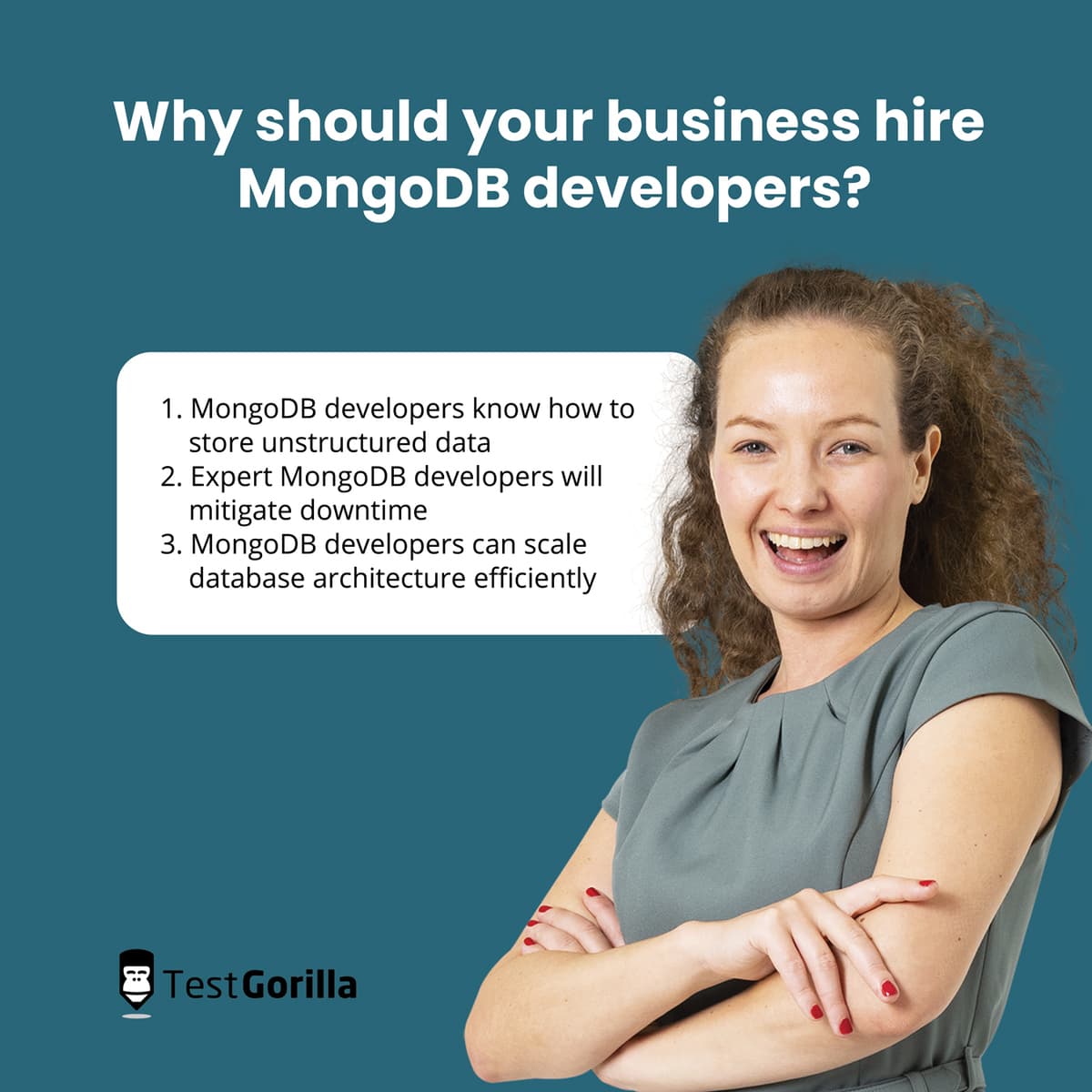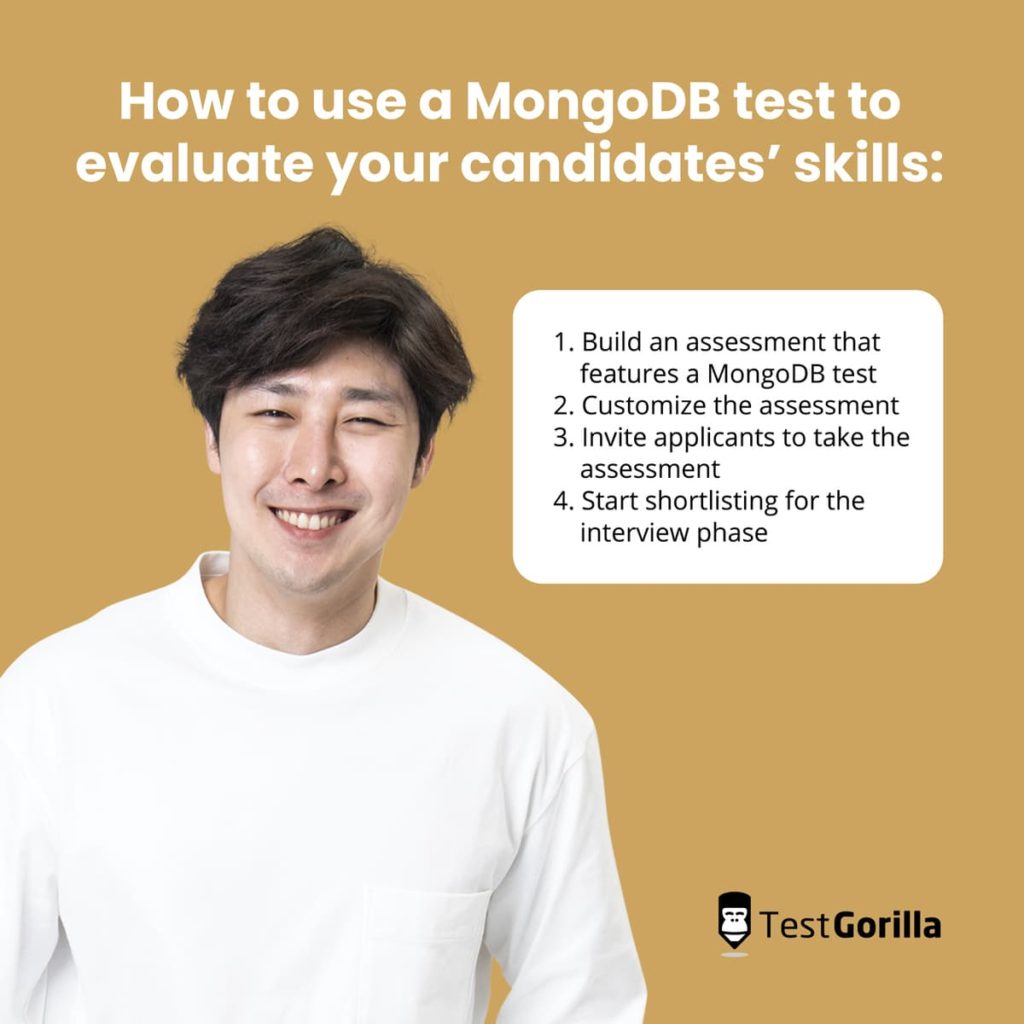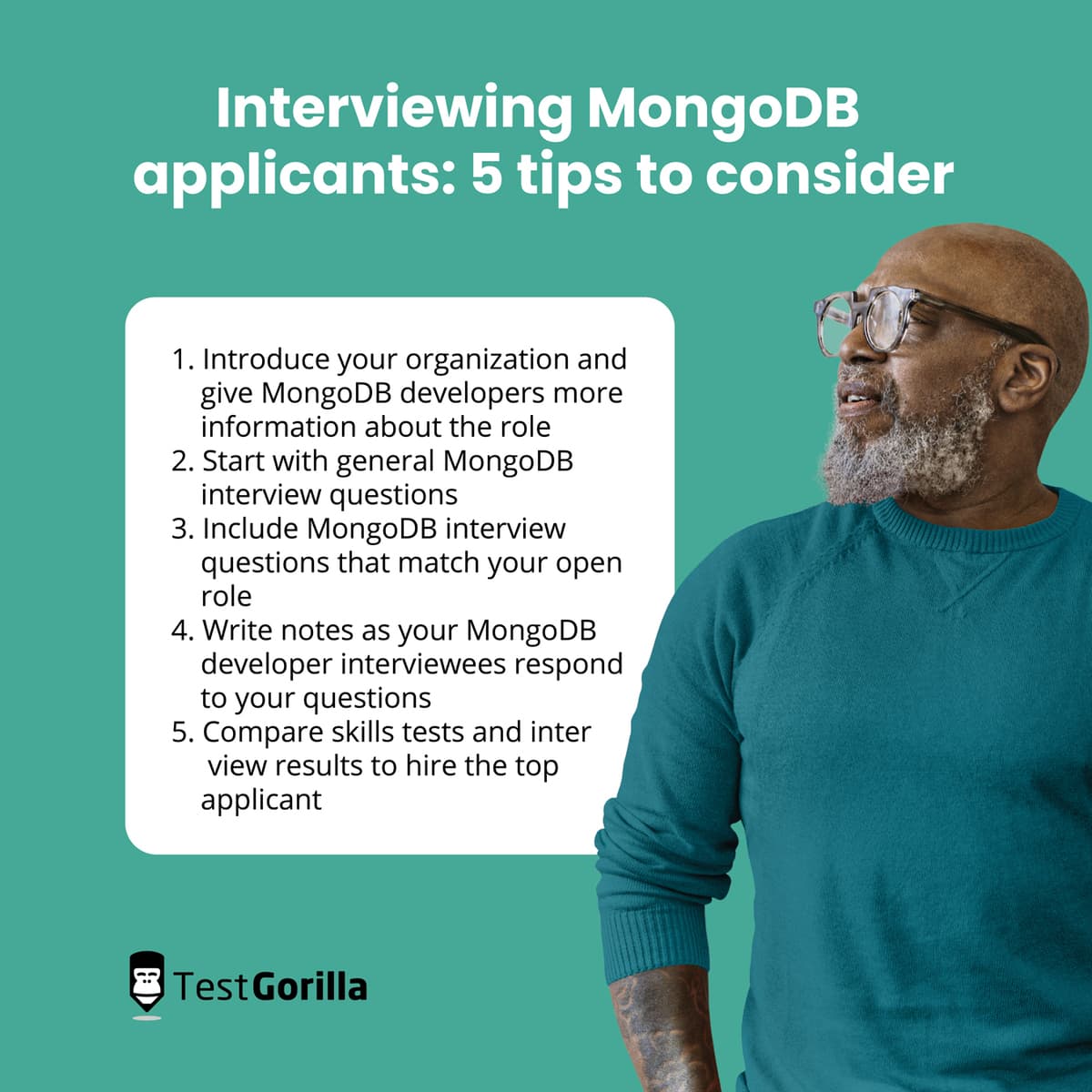Are you looking to hire a highly skilled MongoDB developer for your team?
There’s no sugarcoating it: It can be difficult to find the right person, and there are a couple of things you should know before starting the hiring process.
Before hiring MongoDB developers, you must ensure they have the necessary MongoDB skills for the open role. But how can you check that your developers are skilled enough to handle your project?
If you’re not sure, no worries.
This article will show you how to hire MongoDB developers with the right skills for your role. We’ll also cover some important points about MongoDB, how to use a MongoDB test, and why it is essential for the hiring process.
Table of contents
- For which projects does your business need MongoDB?
- Why should your business hire MongoDB developers?
- How in demand is MongoDB?
- How difficult is MongoDB to learn?
- How does MongoDB compare with Oracle?
- What is the best way to hire MongoDB developers?
- How to use a MongoDB test to evaluate your candidates’ skills
- Interviewing MongoDB applicants: 5 tips to consider
- What is the average MongoDB developer’s salary?
- Hiring MongoDB developers doesn’t have to be a challenge: Use TestGorilla
For which projects does your business need MongoDB?
If your company is working on a news or content website, you’ll need to use MongoDB to facilitate the creation of these pages.
You may also need to use MongoDB to develop websites that fall into the following categories:
Social-media networks
Online banking platforms
E-commerce platforms
Travel and vacation platforms
Entrusting these responsibilities to an experienced MongoDB developer is the fastest, most efficient way to complete your projects. Read on to learn more reasons you may want to hire MongoDB developers.
Why should your business hire MongoDB developers?
If your company already works on projects using MongoDB, it’s obvious that you need MongoDB developers on your team. And if it doesn’t, you should consider using MongoDB and hiring MongoDB developers to take full advantage of this database.
Here are three of the top reasons to use MongoDB and hand over your project to an experienced MongoDB developer.
1. MongoDB developers know how to store unstructured data
It’s possible to store large volumes of unstructured data using MongoDB. With the support of a professional MongoDB developer, you can add different data types to the MongoDB database without needing to set database limits.
2. Expert MongoDB developers will mitigate downtime
Another reason you may prefer to hire MongoDB developers for your business is that modifying relational databases can be slower than using MongoDB.
With an expert MongoDB developer on your team, you’ll have no trouble adding or deleting data structures while mitigating downtime. You’ll also be able to reap the benefits of dynamic MongoDB schemas to make database changes.
3. MongoDB developers can scale database architecture efficiently
Choosing MongoDB and hiring an expert MongoDB developer will make sending data to the cloud or on-site servers effortless since the database has sharding options. If you want to take advantage of cloud services, you’ll have no problems using MongoDB.
The best insights on HR and recruitment, delivered to your inbox.
Biweekly updates. No spam. Unsubscribe any time.
How in demand is MongoDB?
MongoDB is one of the most in-demand and competitive database services companies use for web application development. Many organizations across the globe want to hire MongoDB developers because MongoDB is a highly sought-after database.
A multitude of businesses use MongoDB to facilitate storage, management, and retrieval of data for application building.
What’s more, your developers can use it with most programming languages, so this database is definitely up there with the best.
How difficult is MongoDB to learn?
Another reason MongoDB is so popular is that the database is simple to learn. Your developers can easily build and enhance web applications using MongoDB, particularly if they are seasoned JavaScript developers or are familiar with JavaScript Object Notation (JSON).
How does MongoDB compare with Oracle?
MongoDB and Oracle have a few differences. Specifically, they are written in different programming languages and use different partitioning methods. Oracle also offers integrity features that MongoDB does not, like referential integrity.
Whereas Oracle was built in C and C++, MongoDB was written in C++, JavaScript, Python, and Go. Additionally, Oracle uses a horizontal partitioning method, whereas MongoDB uses a sharding partitioning method.
What is the best way to hire MongoDB developers?
Two incredibly easy methods you can use to hire MongoDB developers are conducting skills testing and interviewing your candidates. Let’s look at how you can integrate these two methods into your hiring process.
How to use a MongoDB test to evaluate your candidates’ skills
It’s important to build skills assessments and invite applicants to complete them as soon as they’ve applied. This method will help you cut down time-to-hire metrics.
Now that you know when to use the MongoDB test, here are the four steps for using the test to assess your applicants’ skills.
1. Build an assessment that features a MongoDB test
Begin by going to a reliable skills-testing platform and building an assessment that features a MongoDB test. When you choose TestGorilla to build an assessment, you can select a MongoDB test and up to four other skills tests to comprehensively assess your applicants’ knowledge and abilities.
2. Customize the assessment
Looking for ways to make your assessment stand out? Use the customization options we offer to make your brand more memorable. Change the default color scheme to match your brand, and upload your logo to create an unforgettable skills assessment.
3. Invite applicants to take the assessment
Now that you’ve prepared the assessment, you can send out invitations for candidates to complete it.
Ask applicants to take the assessment (including the MongoDB test) when you receive their application. You’ve got plenty of ways to do this – simply invite them by sharing a public link, through your applicant tracking system, or via the TestGorilla platform.
4. Start shortlisting for the interview phase
It’s time to begin shortlisting your candidates. You can make this easier by looking at the automated results of the skills assessment. Simply compare your candidates, eliminate those who aren’t a good fit, and create a shortlist of applicants for the interview stage.
Interviewing MongoDB applicants: 5 tips to consider
The results of your applicants’ MongoDB tests will point you in the direction of capable MongoDB developers, but you should still conduct interviews to assess your applicants more thoroughly.
Here are some tips you should consider when interviewing your developers.
1. Introduce your organization and give MongoDB developers more information about the role
Give applicants more information about your business so they won’t have to fill in the blanks. Provide them with more information about the MongoDB developer role to enhance the candidate experience.
2. Start with general MongoDB interview questions
Getting to know your applicants’ experience is always a critical step. Ensure your candidates have relevant experience and enthusiasm for your open role by asking them general MongoDB interview questions.
3. Include MongoDB interview questions that match your open role
Make sure you ask questions appropriate for the role you’re hiring for. Avoid expert MongoDB interview questions if you’re hiring a junior or intermediate-level MongoDB developer.
4. Write notes as your MongoDB developer interviewees respond to your questions
It’s a good idea to write notes as your interviewees respond to your questions. But since not all candidates will appreciate a lack of eye contact, always tell them that writing notes is part of the interview process. You may also want to use a scorecard to facilitate candidate comparison.
5. Compare skills tests and interview results to hire the top applicant
You now have plenty of information to make a hiring decision. Compare your candidates’ results and hire the developer who stands out among the rest.
What is the average MongoDB developer’s salary?
When you propose a starting salary for the applicant you hire, consider that the average MongoDB developer’s annual salary is $167,599. Remember that applicants with exceptional experience earn around $253,000, and candidates with less experience earn about $84,000 per year.
Hiring MongoDB developers doesn’t have to be a challenge: Use TestGorilla
Hiring MongoDB developers doesn’t need to be a difficult process. Remember to begin with skills testing, include a MongoDB test, and invite the best candidates to an interview.
Whether you want to hire internally or find freelance MongoDB developers, bring in new full-time MongoDB experts or pick out MongoDB professionals with the right soft skills, TestGorilla can facilitate the hiring process.
Forget about the challenges of hiring. Use skills testing and interviews to hire an exceptional MongoDB developer for your team.
With TestGorilla, you’ll find the recruitment process to be simpler, faster, and much more effective. Get started for free today and start making better hiring decisions, faster and bias-free.
You've scrolled this far
Why not try TestGorilla for free, and see what happens when you put skills first.

















